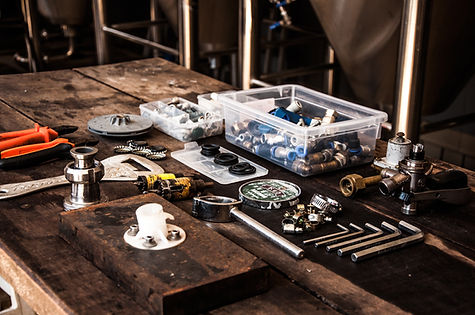HVAC, HEATING & COOLING
We offer installation and maintenance on all cooling systems, refrigerated air and swamp coolers. Maintenance on your cooling unit keeps the system running efficiently saving you money in the long run.


Filters
WHY IS CHANGING YOUR AC FILTERS SO IMPORTANT?
Dirt and debris in your filter can obstruct air flow, increasing the workload of your cooling system. By replacing the filter regularly, you can reduce wear and tear on your air conditioner while allowing the free movement of air for improved indoor comfort. Having a professional perform your home AC conversion ensures the accurate performance of your cooling system. If filters are not changed, it will begin to fail. It will no longer be able to filter the air properly, letting dust and contaminants get into the AC unit. Dust clogs the moving parts of an AC such as fan motors and valves. The HVAC system will draw more power to overcome the obstacle.
HOW OFTEN SHOULD FILTERS BE CHANGED?
Single occupant and no pets or allergies: every 6-12 months.
The "Average" home without pets: every 90 days.
With a dog or cat: Change filters every 60 days.
Add more than one pet or anyone has allergies: Change filters every 20-45 days.
BEAT THE HEAT
Beating the large electric bills during our HOT New Mexico summers
* Selecting a temperature your family is comfortable with and not adjusting up and down during hot months can help stabilize or lower your cooling bill
* Add fans in your home to circulate the air
* Keep the unit set to your selected temperature and avoid turning it on and off
* Block the sun with blinds or drapes
* Unplug devices your not using
* Make sure filters are free of build-up
* Get your unit a checkup to ensure proper efficiency
Let our team of professionals help you get AC unit in top performing condition.
Call our office to schedule your units tune-up


Carbon Monoxide
What is Carbon Monoxide?
Carbon monoxide, or “CO,” is an odorless, colorless gas that can kill you.
Where is CO found?
CO is found in fumes produced any time you burn fuel in cars or trucks, small engines, stoves, lanterns, grills, fireplaces, gas ranges, or furnaces. CO can build up indoors and poison people and animals who breathe it.
What are the symptoms of CO poisoning?
The most common symptoms of CO poisoning are headache, dizziness, weakness, upset stomach, vomiting, chest pain, and confusion. CO symptoms are often described as “flu-like.” If you breathe in a lot of CO it can make you pass out or kill you. People who are sleeping or drunk can die from CO poisoning before they have symptoms.
How can I prevent CO poisoning in my home?
Install a battery-operated or battery back-up CO detector in your home and check or replace the battery when you change the time on your clocks each spring and fall. Place your detector where it will wake you up if it alarms, such as outside your bedroom. Consider buying a detector with a digital readout. This detector can tell you the highest level of CO concentration in your home in addition to alarming. Replace your CO detector every five years.
Have your heating system, water heater, and any other gas, oil, or coal burning appliances serviced by a qualified technician every year.
Do not use portable flameless chemical heaters indoors.
If you smell an odor from your gas refrigerator have an expert service it. An odor from your gas refrigerator can mean it could be leaking CO.
When you buy gas equipment, buy only equipment carrying the seal of a national testing agency, such as Underwriters’ Laboratories.
Make sure your gas appliances are vented properly. Horizontal vent pipes for appliances, such as a water heater, should go up slightly as they go toward outdoors, as shown below. This prevents CO from leaking if the joints or pipes aren’t fitted tightly.
Have your chimney checked or cleaned every year. Chimneys can be blocked by debris. This can cause CO to build up inside your home or cabin.
Never patch a vent pipe with tape, gum, or something else. This kind of patch can make CO build up in your home, cabin, or camper.
Never use a gas range or oven for heating. Using a gas range or oven for heating can cause a build up of CO inside your home, cabin, or camper.
Never burn charcoal indoors. Burning charcoal – red, gray, black, or white – gives off CO.
Never use a portable gas camp stove indoors. Using a gas camp stove indoors can cause CO to build up inside your home, cabin, or camper.
Never use a generator inside your home, basement, or garage or less than 20 feet from any window, door, or vent.
When using a generator, use a battery-powered or battery backup CO detector in your home.
Call our team to have your heating serviced once a year for the safety of your family.
Professional Services
You can count on One Call Plumbing to not only meet, but exceed all your needs and requests. Personalized service by experienced technicians.
Faucet Repair & Replacement, Drain Leaks & Cleaning, Toilet Repair & Replacement, Leaky Tubs & Showers, Main Water, Sewer Line Replacement & Repair, Water Valves, Pressure Reducing Valves, Water Heaters, Hot Water Recirculating Systems, Jetting, Gas, RO Systems, HVAC & Evaporated Air... Installation & Repair

Since its founding, One Call Plumbing LLC has been one of the most trusted names in the industry. Hire us for this service and learn how we cater to the needs of each client, ensuring the results you need and deserve.


